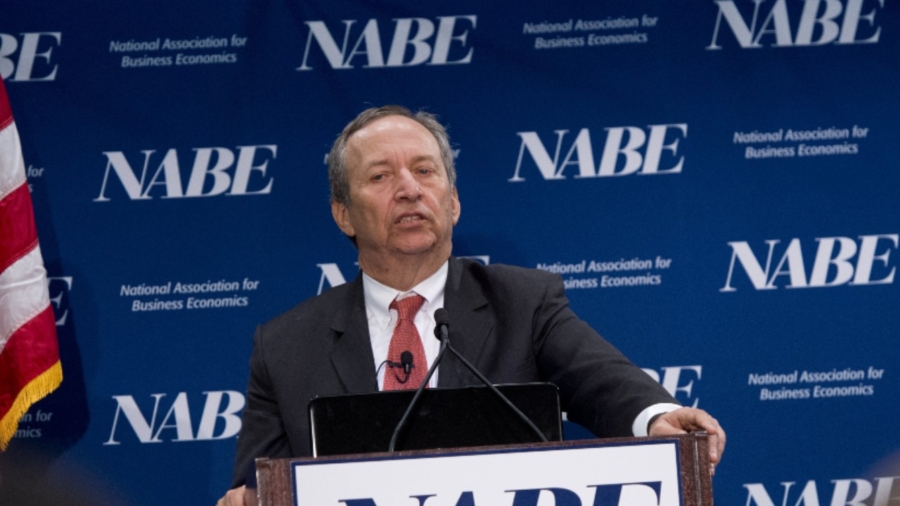Former Treasury Secretary Larry Summers, a critic of loose central bank policies who was early to sound the alarm on the current bout of surging prices, warned in a CNN interview last week that, unless the Fed makes a significant change to policy or an “accident” delivers a major disruptive blow to the economy, it’s “quite unlikely” the rate of inflation will fall back to the central bank’s 2 percent target in the foreseeable future.
“Odds are that we’re going to have inflation of a kind we haven’t seen in 30 years, until either the Fed takes some significant move with respect to monetary policy, or until there’s some kind of accident that disrupts the economic growth we’re enjoying,” Summers told CNN host Erin Burnett in an interview that aired Nov. 13.
The Labor Department’s most recent consumer price index (CPI) data, which reflects rising prices from the perspective of end consumers, shows that inflation rose 6.2 percent in the 12 months through October, the highest reading since 1990. At the same time, the over-the-month rate of consumer price inflation came in at 0.9 percent, more than twice the pace in September.
“I think it’s possible but quite unlikely that inflation will recede back to its normal 2 percent level without some significant change in the path … we’re now on,” Summers added, referring to the Fed’s inflation target of a longer-run average of around 2 percent.
Federal Reserve policymakers, who continue to argue that the current bout of inflation is temporary and will abate when the supply-side dislocations are smoothed out, have responded to surging prices by announcing a rollback in the pace of monthly asset-buys, one of the stimulus measures adopted in response to the pandemic crisis.
At their most recent policy meeting at the beginning of November, Fed officials voted to taper their $120 billion in monthly asset-purchases—buying $10 billion less in Treasurys and $5 billion less in mortgage-backed securities each month.
Still, Fed policymakers left the door open to adjustments in the pace of reducing the bond buys in response to economic recovery data, with the Federal Open Market Committee (FOMC) saying that “it judges that similar reductions in the pace of net asset purchases will likely be appropriate each month, but it is prepared to adjust the pace of purchases if warranted by changes in the economic outlook.”
Summers said he thinks the pace of tapering is too slow.
“If they started by saying that they were going to stop immediately buying mortgages in the midst of a major housing bubble, that would be helpful,” he said, adding that surging housing prices have yet to be fully reflected in the headline inflation numbers.
“If they said they were going to stop growing their balance sheet and not reduce their balance sheet but just stop the process of growing it—if they were going to get that done in three months, rather than in eight, that would be helpful,” he said, suggesting it would also “be helpful” if Fed policymakers abandoned the transitory inflation narrative and acknowledged that they saw overheating in the economy as a “major problem.”
“I think the Fed has made a significant mistake in the approach that it’s taking by doubling down on the massive fiscal stimulus we had at the beginning of the year with really easy monetary policy,” Summers said.
Fed Chair Jerome Powell, who at a Nov. 3 press conference said the Fed’s idea of “transitory” has evolved as inflation turned out to be more persistent than previously thought, insisted the central bank would use the tools at its disposal to make sure inflation “doesn’t become a permanent feature of life.”
“Really for us, what transitory has meant is that if something is transitory, it will not leave behind it permanently or very persistently higher inflation,” Powell said, adding that it is not yet time to raise interest rates as “there is still ground to cover” in terms of labor market recovery.
But with job openings near historic highs and the quits rate, which reflects worker confidence in being able to find a better job, at a record high, Summers judged that the labor market is tight and loose monetary policy counterproductive.
“We’ve got to recognize our problem is not that not enough people have jobs,” Summers said. “The current problem is that we are pushing demand into the economy faster than supply can grow and that we are just going to get more and more inflation until we stop doing that,” he said.
“That’s the real problem.”
From The Epoch Times

